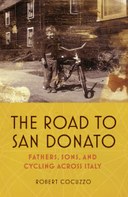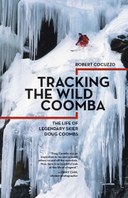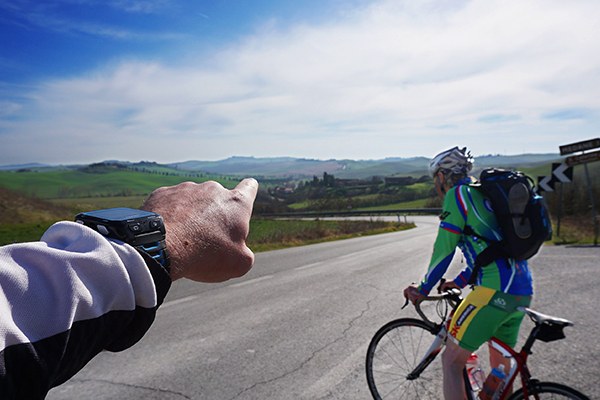
The following excerpt is from the new book, The Road to San Donato: Fathers, Sons, and Cycling Across Italy by Robert Cocuzzo.
The Road to San Donato
Every book is a quotation; and every house is a quotation out of all forests, and mines, and stone quarries; and every man is a quotation from all his ancestors. —Ralph Waldo Emerson
My grandfather looked like he could crush another man’s skull with his bare hands. He was a mammoth of a human being who possessed mesmerizing strength. When a five-hundred-pound tree limb fell in my parents’ backyard a few years ago, Papa drove right over and cut it into pieces using a rusty handsaw, then hauled it away in sixty-pound logs.
Now in his eighties, he still mowed lawns, trimmed hedges, and dragged bags of leaves off properties he’d been caretaking for decades. At eighty-four, Papa painted his entire house—the outside of his house—using a single brush. Neighbors gawked at him through the curtains, holding their breaths as this spritely, two-hundred-plus-pound old man balanced precariously on the last rung of the ladder to paint every single shingle. Eventually one of the neighbors couldn’t bear to just watch anymore. He marched across the street, got to the edge of Papa’s driveway, and yelled, “Hey, Joe, . . . how much for my house?”
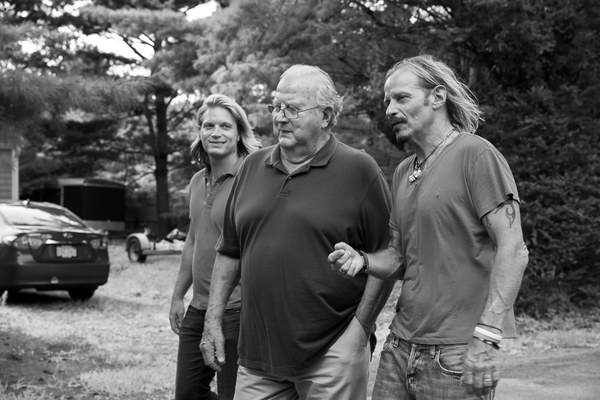 Papa was the first of his family born in the United States and possessed the same bootstrap sensibilities of his Italian immigrant parents. As with just about everyone in his neighborhood, they had come to the United States from a tiny village in southeastern Italy called San Donato Val di Comino. With only a few lire in their pockets, they chiseled off their own hunk of the American dream by laboring hard with their hands. While his family’s roots dug deeper in American soil, Papa clung to his Italian heritage with an intense pride. He spoke about the Old Country with a fondness and whimsy that made it seem like part of him was back in that village, waiting for his return.
Papa was the first of his family born in the United States and possessed the same bootstrap sensibilities of his Italian immigrant parents. As with just about everyone in his neighborhood, they had come to the United States from a tiny village in southeastern Italy called San Donato Val di Comino. With only a few lire in their pockets, they chiseled off their own hunk of the American dream by laboring hard with their hands. While his family’s roots dug deeper in American soil, Papa clung to his Italian heritage with an intense pride. He spoke about the Old Country with a fondness and whimsy that made it seem like part of him was back in that village, waiting for his return.
Despite Papa’s might, he had an Achilles’ heel. Prostate cancer had festered in his body for years, kept at bay with various treatments that our family never really discussed. When the cancer finally broke through his doctor’s defenses, the disease spread throughout Papa’s body like a flash flood. His bull-like strength vanished nearly overnight. He lost seventy pounds and struggled to care for himself. When he slipped and fell in the shower and my grandmother couldn’t help him to his feet, the fire department was called. Picturing the man of all men shivering naked and helpless in the bathtub, waiting to be rescued by a bunch of strangers, broke my heart.
As Papa’s decline steepened, my family’s focus turned to caring for him. Dad and I stopped talking about our cross-country bike trip. Both of us assumed the trip was off until further notice. Instead, we made regular visits to my grandparents’ home in Cape Cod, where Papa took to sleeping most of the day. For the first time in his life, he depended on others to perform even the most menial tasks. In the blink of an eye, this man who could singlehandedly hang a ceiling of sheet rock now couldn’t open a can of soda. The sense of helplessness snuffed out his spirit. We kept up an optimistic facade that he would rebound and return to his virile self, but we knew this was probably the beginning of the end.
A month or so after my Dad pitched the idea for our bike adventure, I drove down to the Cape to visit with Papa. He sat at the kitchen table, flipping through old black-and-white photographs. “Hey, Papa!” I called out, slipping my hand into his and reaching down to hug him. His bony shoulders felt like rungs on a coatrack. “What are you looking at?” I asked.
“I was looking for some papers and I found this manila folder with these snapshots,” he said. I pulled up a seat next to him and watched him scan through the images. Each photo looked like a postage stamp in his still-massive hands. “This one was taken at Blackmore, down in Myrtle Beach. The golf course that Gary Player designed,” he said, adjusting his glasses with thumb and index finger. “There were twenty of us in the group. I think that was a dozen years ago.” He studied the photo, scanning his eyes across the faces. “All these guys are dead,” he concluded with a sigh. “All them passed away. I’ve lost a lot of friends. But anyway, life goes on . . . ”
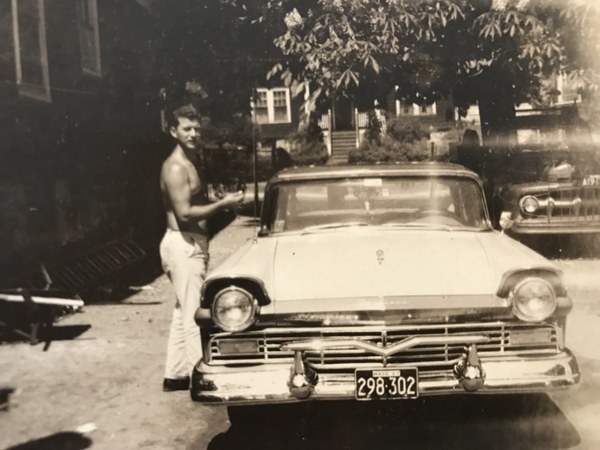 Papa examined one photo after the next, tossing each onto the table like he was folding a hand in poker. He leafed through another stack, then paused on a photo of a younger version of himself standing in front of a white convertible. Bare-chested with a bronze tan and a full head of thick black hair, he had a white cloth in one hand like he had just dried off the last drops of water after washing the car. “I loved that car,” he told me. “Ford convertible. A ’59. Had a rumble seat—you pull a lever and the rumble seat opened in the back. It was a gorgeous car. Black . . . black with a white top. It was a sharp car. I loved that car.”
Papa examined one photo after the next, tossing each onto the table like he was folding a hand in poker. He leafed through another stack, then paused on a photo of a younger version of himself standing in front of a white convertible. Bare-chested with a bronze tan and a full head of thick black hair, he had a white cloth in one hand like he had just dried off the last drops of water after washing the car. “I loved that car,” he told me. “Ford convertible. A ’59. Had a rumble seat—you pull a lever and the rumble seat opened in the back. It was a gorgeous car. Black . . . black with a white top. It was a sharp car. I loved that car.”
“What happened to it?” I asked.
“My father sold that car on me.”
“What?”
“He sold it. That bastard. I was coming back from being aboard a ship in the Coast Guard and he sold it while I was gone. Not only did he sell my car, but he kept the money.” Papa placed the photo on the table. “I never had much love for my father.”
Papa was usually slow to anger, but this photo struck a painful nerve from his past. The raw emotion in his voice was sharp and unfamiliar, and made me realize just how little I knew about his early life. “Why?” I asked. “What was your relationship like?”
“He wasn’t much of a father to me,” Papa said bluntly. “He was a mean bastard, a drinker. I never got a nickel off my father from the day I was born. But I put that aside because I didn’t want to be like him.” He sighed. “Some things you just don’t forget. I still live with it. To this day, I’m very bitter toward him.”
I saw my grandfather as the Italian patriarch who had always sat at the head of the table. The man who could cut down a sycamore as easily as he could slice up a crusty loaf of bread. The details of his life before I was born existed in my mind like these scattered photographs: disjointed stories with little unifying context. I didn’t know the burdens he had faced. He’d always hidden them from me. I knew next to nothing about his father, the man who brought our family name over to the United States from Italy. I wondered, Why was their relationship so toxic? What was the sorrow about?
“Would you look at that?” Papa said, picking up another photo. He bellowed out a wheezy laugh. “This is from Italy . . . the Colosseum.” In the picture he looked two hundred pounds heavier—but a jolly two hundred. Under his arm was my little grandmother and two friends, each in sweat-pants and fanny packs, all four beaming.
“Where’d you go?” I asked.
“Rome,” he said. “We . . . ahh . . . we took a cruise and ended up in Sicily.”
“That must have been nice.”
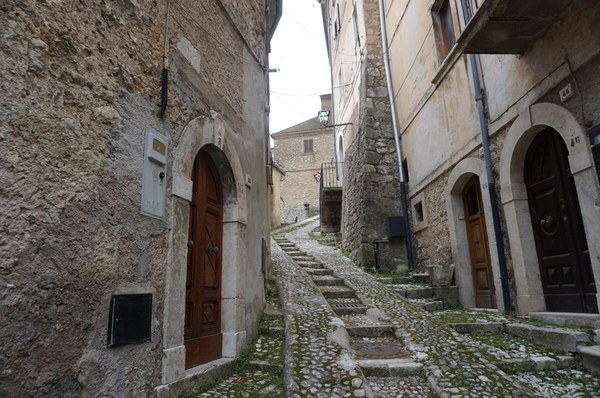 “Oh yeah, it was wonderful, Robbie. Really wonderful.” I asked if he visited San Donato, the village where his family was from. His smile softened. “No, we never made it there,” he said, placing the photo on the table. “I’m upset that we never got a chance to go there.”
“Oh yeah, it was wonderful, Robbie. Really wonderful.” I asked if he visited San Donato, the village where his family was from. His smile softened. “No, we never made it there,” he said, placing the photo on the table. “I’m upset that we never got a chance to go there.”
Never got a chance to go there? I thought. How is that possible? I’d heard about this fabled village for my entire life. The place was practically a living character in our family lore. How on earth had my grandfather never ventured there to see it? For years, he’d talked about this mythic place nestled in the mountains. I assumed he’d been there.
“I would have loved to see it,” he said, shuffling the photos and slipping them back into the envelope with the others. “Even just once.”
I gazed out the kitchen window to the Italian flag flapping off the back-yard shed. For decades, Papa had gone in and out of that shed, fetching tools, tying up bags of trash, cleaning the blades of his lawn mower. Routine had taken over his life—like it does for all of us when we’re not watching. With the end in sight, the costs of that time gone by were crystalizing with regret. He had never been to the village—and he never would. In his regret, I found my own: Why am I only now coming to know this person who has been with me my entire life?
* * *
DAD PICKED UP THE phone on the second ring: “Yo!”
“I got it,” I said.
“Got what?”
“Our cycling trip—let’s go to the village.”
He knew exactly where I meant. “Papa’s village?”
“Yeah. Let’s fly to Florence and pedal to the village. It will be, I dunno, five hundred miles or so.”
Silence. It was one thing for my creature-of-habit father to cycle through towns that spoke his language and served his food and quite another to put an ocean between him and the safety of his routine. I had no idea when he’d last left the country. Chances were, neither did he. But there was something therapeutic about this idea of pedaling through Italy together and discovering the village Papa never got a chance to see. Here we were helpless, watching my grandfather fade day after day. But over there, we could live for him and check that big empty box on his bucket list.
“We’ll go for Papa,” I said. “We’ll pedal to the village, take photos, meet any family we can find there, and come back and tell him all about it.”
“We’ll kind of go in his honor?” Dad said, now on board.
“Exactly.”
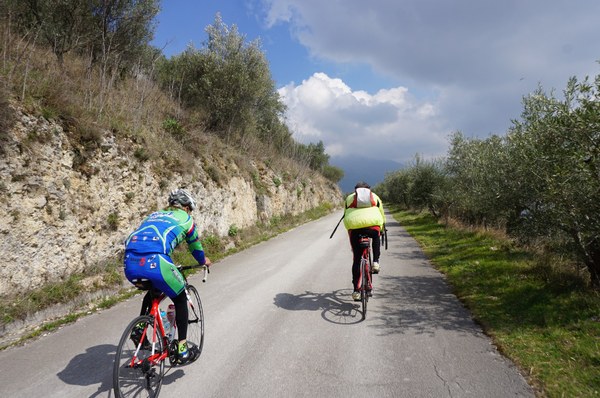 Sitting at the kitchen table with Papa that day, I’d had a vision of my own father. I could picture us sitting at a similar table years from now, flipping through old photographs and sharing regrets of the things we never made time to do together, places we’d never seen. The window of Papa’s life was rapidly closing, with so many things left undone, not the least of which was reconciling with his own father. I didn’t want that to happen for me and my father. Dad’s dream was to pedal across the country. I was going to make sure that we did that—except we’d be pedaling across the Old Country.
Sitting at the kitchen table with Papa that day, I’d had a vision of my own father. I could picture us sitting at a similar table years from now, flipping through old photographs and sharing regrets of the things we never made time to do together, places we’d never seen. The window of Papa’s life was rapidly closing, with so many things left undone, not the least of which was reconciling with his own father. I didn’t want that to happen for me and my father. Dad’s dream was to pedal across the country. I was going to make sure that we did that—except we’d be pedaling across the Old Country.
* * *
I BOOKED OUR FLIGHTS to Florence for late March and researched a cycling route to Rome. Papa’s village of San Donato was around a hundred miles south of the capital city, so I figured we’d be able to piece our way there from Rome. There was a litany of questions to consider. Do we ship our bikes to Italy, or do we rent? Do we use saddlebags and panniers to carry our luggage, or do we simply travel ultra light wearing backpacks? But of all the questions, one reigned supreme: with the tickets booked, would my father stay healthy enough for us to take this trip?
Yes, he was in peak physical condition, probably fitter than most of my friends who were half his age. But my father had an addiction that put his life on the line every single day. It wasn’t an addiction in the traditional sense. As crazy as it might sound, most of my family thought my father was addicted to risk-taking. No matter how hard we pleaded with him, he flat out refused to give it up.
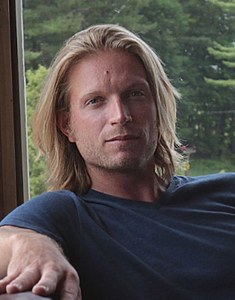 Robert Cocuzzo is the editor of Nantucket Magazine and has written for Outside, Town & Country, Departures, Luxury, and Boston Common. He is also the author of the critically acclaimed Tracking the Wild Coomba: The Life of Legendary Skier Doug Coombs published by Mountaineers Books.
Robert Cocuzzo is the editor of Nantucket Magazine and has written for Outside, Town & Country, Departures, Luxury, and Boston Common. He is also the author of the critically acclaimed Tracking the Wild Coomba: The Life of Legendary Skier Doug Coombs published by Mountaineers Books.
 Mountaineers Books
Mountaineers Books
